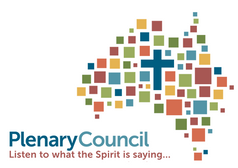
Catholics for Renewal
Subtitle
Editorial May 2021
 Pinterest Osnat Fine Art Into The Light.jpeg)
Plenary Council contributions and concerns
"When the day of Pentecost had fully come, they were all with one accord in one place" Acts 2:1
Ten years ago Catholics for Renewal urged the Australian bishops to convene a long-overdue plenary council in 2015, the 50th anniversary of the close of Vatican II. From the time they decided a Plenary Council was opportune we have made every effort to ensure it succeeds in renewing our Church.
Our contributions
to the Council are several. The major one was our 152-page submission in 2019,
which Garratt Publishing subsequently published in book form as Getting Back on Mission: Reforming Our
Church Together
We then produced a
series of 10 Summary Documents, accessibly explaining some key terminology and
principles fundamental to renewal. Now, in collaboration with Garratt
Publishing, we announce the publication of these Summaries as a free e-Flipbook
titled (and linked to) Keys to Reforming Our Church
Together.
Our president, Dr Peter Wilkinson,
has also made contributions. One was his series of articles on previous provincial
and plenary councils held in Australia since 1844 (Item # 78, Catholics for Renewal Documents). More recently he
has been preparing profiles of all 28
territorial dioceses (Item # 99, Catholics For Renewal Documents), 16 of which have already
been published together with another 4 launched in our May Newsletter. We thank the
many bishops who have assisted to ensure their accuracy. We also strongly supported the recent 1st Convocation of Catholics organised by the Australasian Catholic Coalition for Church Reform (those who missed the prophetic message of
Benedictine spiritual leader Sr Joan Chittister may sign up to view the
video (HERE).
However, we do have some serious concerns, some voiced publicly and others privately, that the Council is not adequately attending to the expressed needs of the people of God.
Concerns
A long-held concern has been the reluctance of diocesan bishops
to convene diocesan assemblies or synods during the Council’s preparatory stage.
Such assemblies are far more essential than the ‘commissioning’ rituals conducted
by some dioceses. Council members called to ‘represent’ the faithful of their
diocese cannot fulfil their role unless they listen and engage directly with
the faithful. Many are unknown to their communities who
have no means of contacting them. An ‘un-contactable’ representative is an
oxymoron. We urge Council organisers to immediately publish all members’
background and appropriate contact details.
We voiced our concern
privately to Council organisers in March 2020 when they published the names of
257 individuals ‘called’ to participate in the Council.
Organisers designated them diocesan ‘delegates’, implying their authority to
govern at the Council came from their local bishop. In fact, their authority
came from the ‘call’ by the Council President. We argued then that the term was
inappropriate and canonically wrong. It now seems the Holy See shared our view,
for in the recently published Statutes
and Regulatory Norms for the Council prepared by the
ACBC without public consultation and approved by the Holy See, the term
‘delegate’ has been replaced by the more appropriate term ‘member’. But not so in the Instrumentum Laboris.
In the February 2021 revised list of 280
persons officially called to the Council, all are called ‘members’ and include:
- 39 Members with a deliberative or deciding vote (only bishops or their equivalent); and
- 241 Members with a consultative vote (107 priests, 1 deacon, 26 religious sisters, 4 religious brothers, 39 lay men, and 65 lay women)
Our March 2021 Newsletter editorial expressed serious concern with the Instrumentum Laboris. We found it ‘a huge disappointment’ and stated our reasons: it “failed to organise the rich harvest of wisdom, insight and analysis of the national consultations into a coherent presentation”, it “took us nowhere in particular”, and “certainly not towards an agenda that will achieve genuine reform and renewal in our Church [and] get it ‘back on mission’.” (HERE)
We now raise another concern - the voting process.

Voting process
Article 27 of the
Statutes stipulates that consultative
voters will cast their vote first, with deliberative voters not permitted to participate
in this vote; the result of the
consultative vote is not binding on deliberative voters; and deliberative
voters will subsequently cast their votes, but never at the same session of an
assembly. However, should the deliberative voters oppose the overwhelming
consensus of the consultative voters on a particular motion, the Statutes do not require them to have
regard to the consultative vote nor to make public their reason(s) for opposing
it.
We find this lack of a requirement for transparency and accountability on the part of the deliberative voters a major concern that has to be addressed.
We accept that the deliberative voters - bishops and their equivalents - must ultimately make the final decisions. But they must be accountable for their decisions. For the deliberative voters to oppose an overwhelming consensus of consultative voters without revealing reason(s) for doing so would be a failure in transparency and accountability. Canon 127 of the Code of Canon Law requires that ‘superiors’ – in this case the deliberative voters - should not oppose the unanimous vote of their ‘advisors’ – in this case the consultative voters - unless they have an ‘overriding reason’ for doing so.[1]
As
an example, should the consultative voters vote unanimously in favour of a
motion mandating diocesan pastoral councils - already a canonical default
requirement ignored by most Australian bishops - the deliberative voters could,
under the Statutes, reject the motion
without consideration of the consultative vote and refuse to disclose their
reason(s).
The principles of transparency and accountability demand, and c 127 suggests, that a public disclosure of the overriding reason(s) is imperative, as is its recording in the minutes, so that the Holy See is aware of the division. On review, the Holy See could, as it has in previous councils, overturn a deliberative vote. Non-disclosure offends against the spirit of dialogue that should characterise communion in the Body of Christ.
Another major concern we have relates to the constraints of the Oath upon all members of the Council. We will explain this in our next Newsletter.